Top Ten Major Events in Greek History
Greece has a fascinating history. From its legendary mythology to its philosophical achievements, they were the model society. Greece would be the precursor for most other civilizations. It made groundbreaking achievements and great stands of morality. This list will go over major events in Greek history. Feel free to submit an item, comment, and/or remix. Just make sure it is actually pertaining to Greek history. I really hope you enjoy, because this list took forever to research just like the Roman list. Enjoy!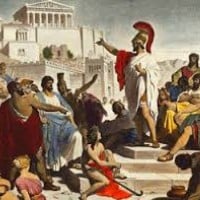
The Age of Pericles is debatebly the most important period of time in the history of the world. People forget how important this was. This was the beginning of Democracy. It was called The Assembly of the People. It was a time of economic and cultural prosperity. It was also a time of great philosophical thinking, medical developments, and arts. Just think though. Without the Age of Pericles, would there be democracies? At least the way we have them now? Pericles was one of the best leaders in history, because of his willingness to give power to the people, and of course his great oratory skills. It would change history for ever. This was the first, and maybe only, true democracies and one of the only nations to achieve true free speech. The Age of Pericles would later end with the Plague of Athens.
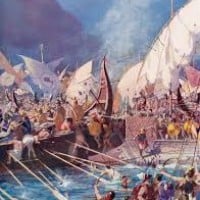
The Greco-Persian Wars was one of the more famous wars in history. It is makes by two invasions by the Persians. The first one was by King Darius. He invaded Greece and while en route to Athens he was defeated at the famous Battle of Marathon in 490 B.C., 9 years into the war. He then planned another invasion, but died. In 480 B.C., his son, Xerxes took over and gathered one of the largest armies in history. Fortunately Persian armor was weak, so while they were huge, they were defeatable. It came to a head at the famous Battle of Thermopylae in 480 B.C. 300 Spartans stood up to the massive hoard and while they almost won, they ultimately lost. This would inspire the rest of Greece though and they would end up turning the tide at The Battle of Salamis and would decisively defeat the Persians at the Battle of Plataea. The Greco-Persian Wars will always be a symbol of freedom prevailing over tyranny. It also stopped the Persians from taking the whole world.
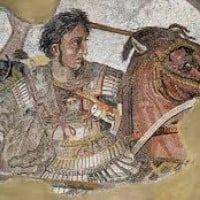
The Reign of Alexander the Great united Greece into one kingdom and saw Greece reach its biggest size. After the death of his father, Philip II, in 336 B.C. Alexander took over the Macedonian Empire. He united the Greek City States, something no one was able to do, and led Greece in conquests in Asia. He was obviously a great military leader and never lost a battle. His time as king, pharaoh, and lord of multiple places would lead to riches and prosperity back home. He also founded the influential city of Alexandria. While I don't really like Alexander the Great that much, I do respect his legacy as the man who unified Greece.
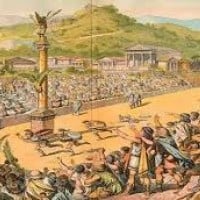
The Olympics were first introduced in Olympia Greece in 776 B.C. in devotion to the Gods. It is a every four year contest in multiple different areas. From athletics to fighting. Along with that they would do ritual sacrifices. Besides money and democracy, The Olympics might be the most lasting contribution from Ancient Greece, as it still happens every four years to this day. Well obviously not this year because of Covid, but you know what I mean.
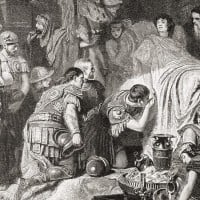
While Alexander's life brought prosperity, his death caused chaos. While in Babylon in 323 B.C., Alexander came under a horrible sickness. There are multiple theories about his death. Famous Roman/Greek historian, Plutarch records that he got a really bad fever after spending a full night and day drinking. Diodorus records that he died after drinking unmixed wine in honor of Heracles, no fever. There is also the theory that Alexander was poisoned. 4 ancient historians mention it, but only one supports it. Nevertheless, the worst part is what happened as he dies. Alexander had no immediate heir, which is weird saying how much he slept, so when he was asked who would be his heir, he said, "to the strongest." That would plunge Greece into chaos over who would be the heir. Greece would never recover.
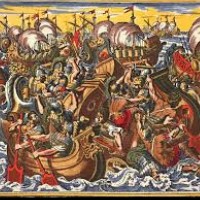
The Peloponnesian War was a huge war between the two most powerful city states in Greece. Athens and Sparta. Athens was in the middle of its golden age and touted many advancements that I will talk about in another item. Sparta had strongest and debatebly the best military in history. They were a killing machine. They of course had allies. The Spartans led the Peloponnesian League and Athens led the Delian League. The war is generally divided into three segments. We got the Archidamian War, in which Sparta launched multiple attacks on Attica and Athens replied by dominating the sea from 431 to 421 B.C. The first phase ended with the deaths of Cleon and Brasidas, the leader of Athens after Pericles died and a head Spartan general respectively. The second phase began after Athens decided to break relative peace to invade Sicily in 415 B.C., a Spartan ally. It ended in a horrible defeat for Athens. The third phase from 413 to 404 B.C., was basically Athens attempting to rebuild, but Sparta ultimately destroying them. Sparta ended the golden age of Athens, but ultimately it brought a new sense of friendship into Greece.
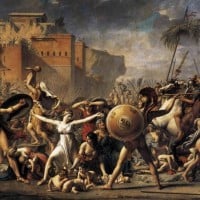
The Trojan War is very mythical obviously. It is talked about in the legendary epics, The Illiad and The Odyssey. Troy was a real place as it was found through archaeology and there was a real war. The war took place anywhere from the 13th to 11th Century B.C. It was fought between the Greeks and the Trojans. Past that it is debatable what is true and what it not. Huge event though in the history of Greece. Just lower, because we cannot confirm the accuracy of Homer's story. I want to thank you for looking at this list. If you really liked it feel free to comment, remix, or even share. Thanks!
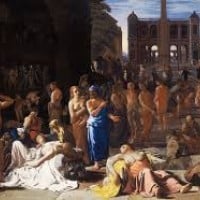
The Bubonic Plague is what ended Greece's Golden Era. During the Peloponnesian War, Sparta laid siege to Athens and basically blockaded them. Due to no food being brought in and the city being overcrowded, the plague started. From 430 to 427 B.C. It killed Perikles and 75 to 100 thousand other Athenians. This plague would be a heavy hitter and hurt Athens for years to come.
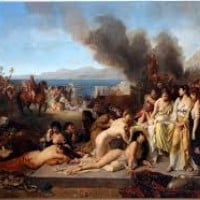
In 146 B.C., after the Battle of Corinth, the quick rising Roman Empire took over the Greek peninsula and secured them as a province. However this would not lead to fall of Greece. While it was occupied by Rome, Rome appreciated the history of Greece and even helped rebuild their society. Corinth was made the capital of the region and Athens was rebuilt into a city of philosophical thinking and learning.
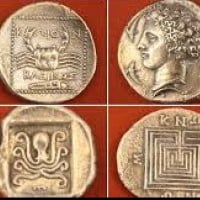
In the 6th or 5th century B.C. money was first made in Greece. The actual invention is shrouded in mystery. This is very big though, because it revolutionize trading. Because of the details of it are not there I had to push it down a few spots.